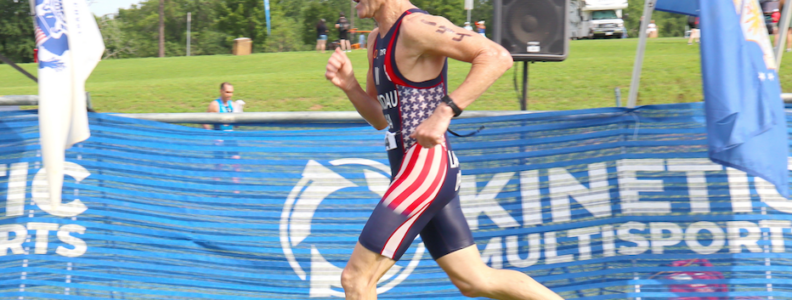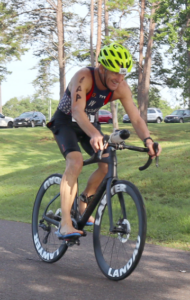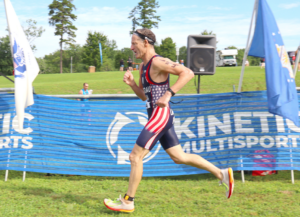
Lawyer Landau makes coffee nervous! (Caffeine & sports performance)
Doug Landau’s high energy in the courtroom, at the Law Shop and in sports competitions has been described as “high energy.” One of his law clerks even noted that the kinetic trial attorney “makes coffee nervous!”

While Landau eschews the taste and smell of “boiled bean juice” (coffee), like his London England born grandfather Louis Bennett Landau, he starts most days with a tall cup of black tea. When Doug worked for the English Solicitors firm of Robin Thompson & Partners at their London office as their first American law clerk, he enjoyed the daily tea service at 9 and 3.
Doug’s bride, a regular coffee drinker, often observes Doug’s morning tea routine. When Doug then adds maple syrup, orange (or other citrus) juice, and half a packet of the powdered vitamin supplement EmergenC, “it looks like a chemistry experiment gone very wrong!” Landau finds that the tea helps get him ready for intense multisport workouts and races. Also, on those days where he has a second workout, he will have another cup, sometimes with apple cider or other sweetening ingredient, as he is trying to avoid the artificial sweeteners. Having studied exercise physiology at Grad School at Boston University, lawyer Landau has long known of the ergogonic effects of caffeine on aerobic sports performance.
Sports science has shown that caffeine can improve athletic performance by 2-5%. This is true whether it is ingested as coffee, sports supplement or energy drink. This is true of short, anaerobic efforts, but more impressive in the realm of longer, aerobic exercise bouts. A recent article in the New York Times contains several findings from current research and clinicians. Landau notes that the effectiveness of caffeine can vary among athletes, in his own highly competitive family, some notice a significant effect and others get very little out of this naturally occurring stimulant. Some people metabolize (digest) caffeine very quickly, and in others, the biochemical processes take long time. Landau has found that timing his pre-race “tea time” to 45 minutes prior to the starting gun seems to have best effect.

There are several caveats to caffeine consumption. (How’s that for alliteration!) First, the increase in heart rate can make an athlete urinate more frequently. Having to pee when already in the starting pen at a track meet would not be an optimal situation! Second, in very hot conditions, the dehydration caused by excess caffeine consumption can lead to cramps and other performance inhibiting side effects. Too much coffee can also cause the jitters and ectopic foci, which are the random heart beats that give you that “jolt” that keeps you awake t night during long exam study sessions. Lawyer Landau advises that, “it is best to experiment with how much caffeine is right for you BEFORE a major competition. You do not want to try anything new on race day.”
The pathophysiology of caffeine is its ability to bind with adenosine, a neurotransmitter that connects to specific receptors in the human nervous system that make us feel sleepy. The caffeine in your cup of Joe, tea time treat or energy drink binds to those receptors to block the adenosine from causing the drowsiness. The result is stimulation, which in turn, releases other chemicals (hormones) in the body, like epinephrine and dopamine, which affect alertness, mood, focus, etc. Evidence tends to suggest that caffeine puts more hustle in our muscle. Our body utilizes calcium to to start the muscle contraction (shortening) process. The cup of espresso or Earl Gray helps “mobilize caffeine ions so that they have a greater interaction with the filaments that induce muscle fibre contractions,” according to the NYTimes piece. In other words, caffeine helps our muscles produce more force which may be beneficial in training performance and sports competition.
So how much coffee, tea or energy drink is optimal? According to the NYTimes piece:
Studies show that the ideal performance-enhancing dose ranges between 1.4-2.7mg per pound of body mass (though some research shows that even lower doses can work).
Given that a typical 8 oz. cup of coffee has 100 mg. of caffeine (though this can vary depending upon type, brewing method, etc.), 2 cups might be the right amount for a 150 lb. athlete like lawyer Landau, as this comes out to approx. 1.3 mg per pound bodyweight. However, Landau has found that he prefers the equivalent of 3 cups, about 45-60 minutes pre-race, so as to have sufficient time to absorb the caffeine, get to the port-a-john and warm up!
While there are also draw backs to consuming too much caffeine, trial and error, just as with case preparation, can lead to finding “the sweet spot” for your own training and racing optimization. For example, Landau tries to avoid tea and other caffeine too close to bed time, as it can interfere with the all-important sleep and sports recovery. Performance gains realized through caffeine consumption can be negated by chronic sleep disturbance. Other side effects include jitters, anxiety, nervousness and increased blood pressure. Then there are the infamous side effects of caffeine withdrawal, such as headaches, fatigue and impaired concentration. As with most things, moderation is the key and listening to your body can be critically important. So while you won’t see Doug Landau drinking coffee before or after races or Masters swim practice, you can bet that he has already had his morning cup of tea!
